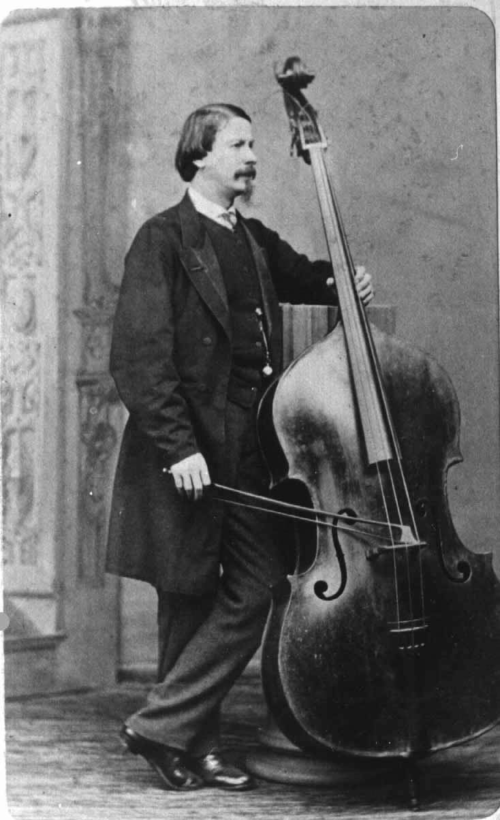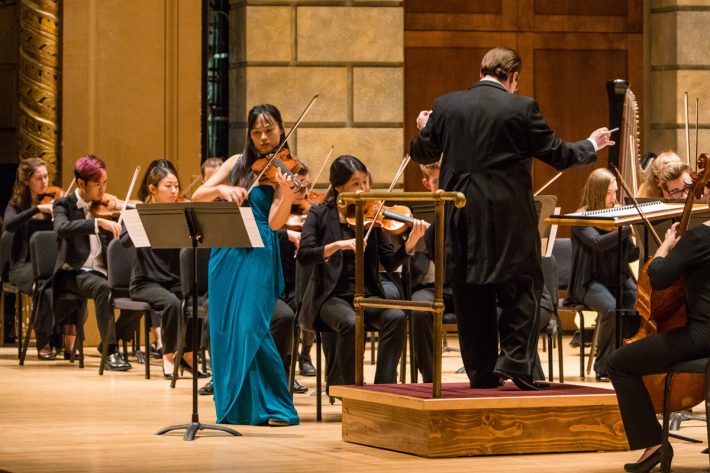Enrichment and Excitement: Two ECMS Interns Solo with Eastman Orchestras
February 6, 2018by Cameron Burch
ECMS intern Cameron Burch sat down with two ECMS faculty interns, violinist Wendy Toh and bassist Justin McCulloch, to discuss their solo performances with the Eastman School Symphony Orchestra. Justin performed the Bottesini Concerto No. 2 on October 20. 2017, and Wendy performed the Violin Concerto by fellow Eastman graduate student Zoe Wang on November 8, 2017.
Cameron: What was it like performing with ESSO?
Justin: It was a blast. I had never had the opportunity to perform a full concerto as the featured soloist with an orchestra before and truly enjoyed the opportunity.
Wendy: It was one of the most wonderful experiences of my musical life! They were such inspiring, responsive, and dedicated musicians that it was a real joy working with them. It was also very meaningful to me as I performed frequently as a member of the ESSO in my undergraduate days at Eastman. It is very special to have the opportunity to perform with an orchestra that has been a big part of my experiences and fond memories.
Cameron: Is there a difference between the approach you take when playing a solo, as opposed to your approach as a member of a section?
Wendy: As a soloist, I find myself constantly listening for sound projection out in the hall, whereas when I perform as a member of an orchestra, I seek to actively blend my sound and colors with others as a team and listen out for a “section sound”. As a soloist, I find ways to maximize the delivery of my ideas and sounds so that they carry to the back of the hall. This can mean the timing and placement of notes and the use of vibrato and bow speed in creating projection. Quite often, being a soloist and a member of the orchestra share musical skills that are more similar than different. For one, both require one to actively support while gently lead.
Justin: There are a number of differences. First off, my bass is actually tuned different from the other basses in the section. Double basses use different strings (solo strings) that are tuned a whole step higher to perform solos than when in the orchestra section. The solo strings give the instrument a brighter, more penetrating sound, whereas in the section you want a much darker, warmer sound. Second, the concerto was completely memorized. In the orchestral section it’s frowned upon to perform the music from memory; memory slips, changes to the score, bowings or articulations happen all the time and can’t be memorized in time for the concert. Finally, there is also the showmanship factor of being a soloist. We tend to be rather stoic as section players, so having to opportunity to play as a soloist gives you a little freedom to have a bit more flair in your playing.
Cameron: How did you get the opportunity to perform a solo with ESSO?
Wendy: I was very lucky to be the soloist for the Eastman Composition Department’s annual orchestra reading in spring this year for my colleague and friend Zoe Yucong Wang’s Violin Concerto. She is a very fine composer and collaborative pianist at Eastman. Upon winning the orchestra reading, her piece was chosen for its premiere by the Composition Department.
Justin: Eastman School of Music provides an opportunity for each instrument in the orchestra to perform as a soloist. Each concert will feature a different instrumental soloist, so every couple of years the opportunity for your instrument swings back around again. The bass studio was informed that this fall the Eastman School Symphony Orchestra would be performing the Bottesini Double Bass Concerto No. 2, and that there would be a competition for which the winner would be the soloist with the orchestra. I was fortunate enough to win the competition and thus play with the orchestra.
Cameron: Wendy, does it feel different playing such a modern solo, as opposed to the general idea of classical or baroque style pieces? If so, how is the performance different?
Wendy: I have always thoroughly enjoyed performing pieces that reflect a contemporary language, since I always feel a deep connection with voices fused with elements of our times. It is absolutely rewarding to be the first to dig into a piece, or a concerto in this case, since I have the resources of having the composer address any questions that may arise. I was immensely excited for the premiere of Zoe’s Violin Concerto knowing that this is the first public performance in its history. I am attracted by the freedom to interpret the music using instincts and skills I have garnered from tradition repertoire. Modern music is quite similar to traditional music: it strives to express a feeling, deliver a thought, and/or capture a moment. In these ways, both modern and traditional music convey messages through gestures, affects, characters, and so on. What makes them different and meaningful is the way their languages reflect their own socio-cultural stories which we, as performers, seek ways to convey those narratives.
Cameron: How can an experience like this tie into your life as an educator?
Justin: Experiencing different aspects of performance and life all inform your way of teaching and can give a greater depth and knowledge of playing to your students. For me a large aspect of performing is learning how to control anxiety and the mental skills and techniques that can be used to overcome it and perform at your highest while under pressure. It was definitely one of my own personal milestones to perform as a soloist and feel in control of my own anxiety and truly enjoy the experience.
Wendy: There is such a close connection between my performing and teaching careers. In the exciting cycle of concert preparation and performances, I learn to refine what I do so that the music that I make can come close in resembling what I imagine it to be. Teaching completes the circle as it allows me to apply almost every skill I have acquired in performing. My students are great resources in my learning experiences- since every student is unique and special, I constantly find myself referencing to ideas and analogies that surface in lessons with different students as I practice, and vice versa.
Cameron: Does being a part of ECMS influence your career in performance?
Justin: Of course. The teacher often learns as much as the students. Constantly reviewing basic techniques, musicality and style, helps me to continually review my own playing to see where I can improve and what I can do better. It also helps keeps the excitement of music in your mind. It’s easy to get bored of the same repertoire in the orchestra section year after year, but when a student approaches it for the first time, it’s like a child learning how to walk. There is an excitement in the parents and the child’s eyes that is hard to explain without experiencing it. Playing and teaching great music can be much the same.
Wendy: The enrichment ECMS brings to the community aligns with my personal philosophy that the best way to enjoy music is through sharing with others. I actively perform in different community spaces such as Groupmuse house concerts in different living rooms of neighborhoods, multi-media performances in NYC, benefit concerts at churches, and demonstrations at libraries in Rochester and Syracuse. I am constantly amazed by how ECMS generates excitement in the community through music. I am inspired to convey the remarkable spirit of inclusivity and diversity in the ECMS culture to my future projects. Through community concerts and fund-raising events, I hope to continue embarking on performances that will benefit the community while sharing what I love with others!


